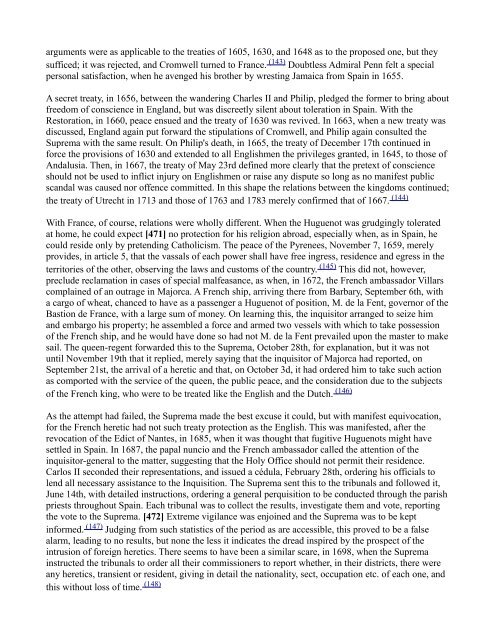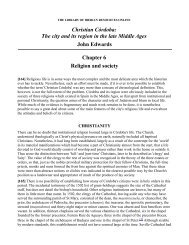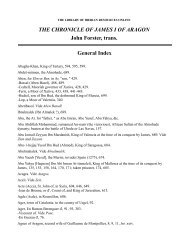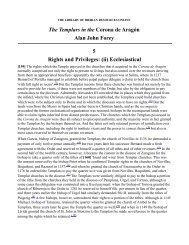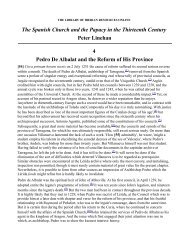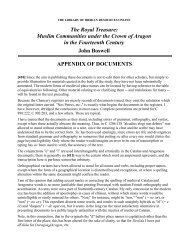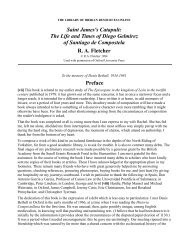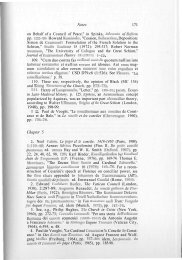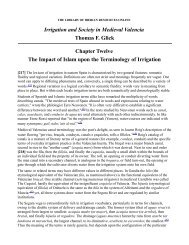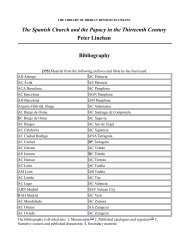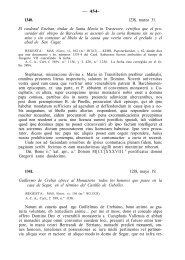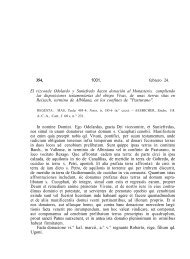PROTESTANTISM - The Library of Iberian Resources Online
PROTESTANTISM - The Library of Iberian Resources Online
PROTESTANTISM - The Library of Iberian Resources Online
Create successful ePaper yourself
Turn your PDF publications into a flip-book with our unique Google optimized e-Paper software.
arguments were as applicable to the treaties <strong>of</strong> 1605, 1630, and 1648 as to the proposed one, but they<br />
sufficed; it was rejected, and Cromwell turned to France. (143) Doubtless Admiral Penn felt a special<br />
personal satisfaction, when he avenged his brother by wresting Jamaica from Spain in 1655.<br />
A secret treaty, in 1656, between the wandering Charles II and Philip, pledged the former to bring about<br />
freedom <strong>of</strong> conscience in England, but was discreetly silent about toleration in Spain. With the<br />
Restoration, in 1660, peace ensued and the treaty <strong>of</strong> 1630 was revived. In 1663, when a new treaty was<br />
discussed, England again put forward the stipulations <strong>of</strong> Cromwell, and Philip again consulted the<br />
Suprema with the same result. On Philip's death, in 1665, the treaty <strong>of</strong> December 17th continued in<br />
force the provisions <strong>of</strong> 1630 and extended to all Englishmen the privileges granted, in 1645, to those <strong>of</strong><br />
Andalusia. <strong>The</strong>n, in 1667, the treaty <strong>of</strong> May 23rd defined more clearly that the pretext <strong>of</strong> conscience<br />
should not be used to inflict injury on Englishmen or raise any dispute so long as no manifest public<br />
scandal was caused nor <strong>of</strong>fence committed. In this shape the relations between the kingdoms continued;<br />
the treaty <strong>of</strong> Utrecht in 1713 and those <strong>of</strong> 1763 and 1783 merely confirmed that <strong>of</strong> 1667. (144)<br />
With France, <strong>of</strong> course, relations were wholly different. When the Huguenot was grudgingly tolerated<br />
at home, he could expect [471] no protection for his religion abroad, especially when, as in Spain, he<br />
could reside only by pretending Catholicism. <strong>The</strong> peace <strong>of</strong> the Pyrenees, November 7, 1659, merely<br />
provides, in article 5, that the vassals <strong>of</strong> each power shall have free ingress, residence and egress in the<br />
territories <strong>of</strong> the other, observing the laws and customs <strong>of</strong> the country. (145) This did not, however,<br />
preclude reclamation in cases <strong>of</strong> special malfeasance, as when, in 1672, the French ambassador Villars<br />
complained <strong>of</strong> an outrage in Majorca. A French ship, arriving there from Barbary, September 6th, with<br />
a cargo <strong>of</strong> wheat, chanced to have as a passenger a Huguenot <strong>of</strong> position, M. de la Fent, governor <strong>of</strong> the<br />
Bastion de France, with a large sum <strong>of</strong> money. On learning this, the inquisitor arranged to seize him<br />
and embargo his property; he assembled a force and armed two vessels with which to take possession<br />
<strong>of</strong> the French ship, and he would have done so had not M. de la Fent prevailed upon the master to make<br />
sail. <strong>The</strong> queen-regent forwarded this to the Suprema, October 28th, for explanation, but it was not<br />
until November 19th that it replied, merely saying that the inquisitor <strong>of</strong> Majorca had reported, on<br />
September 21st, the arrival <strong>of</strong> a heretic and that, on October 3d, it had ordered him to take such action<br />
as comported with the service <strong>of</strong> the queen, the public peace, and the consideration due to the subjects<br />
<strong>of</strong> the French king, who were to be treated like the English and the Dutch. (146)<br />
As the attempt had failed, the Suprema made the best excuse it could, but with manifest equivocation,<br />
for the French heretic had not such treaty protection as the English. This was manifested, after the<br />
revocation <strong>of</strong> the Edict <strong>of</strong> Nantes, in 1685, when it was thought that fugitive Huguenots might have<br />
settled in Spain. In 1687, the papal nuncio and the French ambassador called the attention <strong>of</strong> the<br />
inquisitor-general to the matter, suggesting that the Holy Office should not permit their residence.<br />
Carlos II seconded their representations, and issued a cédula, February 28th, ordering his <strong>of</strong>ficials to<br />
lend all necessary assistance to the Inquisition. <strong>The</strong> Suprema sent this to the tribunals and followed it,<br />
June 14th, with detailed instructions, ordering a general perquisition to be conducted through the parish<br />
priests throughout Spain. Each tribunal was to collect the results, investigate them and vote, reporting<br />
the vote to the Suprema. [472] Extreme vigilance was enjoined and the Suprema was to be kept<br />
informed. (147) Judging from such statistics <strong>of</strong> the period as are accessible, this proved to be a false<br />
alarm, leading to no results, but none the less it indicates the dread inspired by the prospect <strong>of</strong> the<br />
intrusion <strong>of</strong> foreign heretics. <strong>The</strong>re seems to have been a similar scare, in 1698, when the Suprema<br />
instructed the tribunals to order all their commissioners to report whether, in their districts, there were<br />
any heretics, transient or resident, giving in detail the nationality, sect, occupation etc. <strong>of</strong> each one, and<br />
this without loss <strong>of</strong> time. (148)


